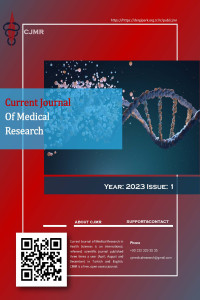Abstract
Amaç: Tıp öğrencilerinin farklı eğitim tiplerinden geçtikleri yoğun akademik takvimleri boyunca uyku kalitelerini ve bunun farklı dönemlerdeki değişimine dikkat çekmek istedik. Çalışmanın amacı tıp fakültesinde farklı dönemlerdeki (Dönem 1-6) öğrencilerin uyku kalitelerini ölçmek, karşılaştırmak ve bunu etkileyen değişkenleri saptamaktır.
Yöntem: Araştırmanın verileri İzmir Kâtip Çelebi Üniversitesi Tıp Fakültesi öğrencilerinden toplanmıştır. Toplam 308 öğrenci (126 erkek, 182 kadın) anketi tamamlamıştır. Öğrencilerin uyku kalitesi Pittsburgh Uyku Kalitesi İndeksi (PUKİ) ile ölçülmüştür. Veriler SPSS 25 programında değerlendirilmiştir.
Bulgular: Tıp fakültesinin farklı dönemlerindeki öğrencilerin uyku kaliteleri arasında anlamlı bir farklılık görülmedi. 306 öğrencinin PUKİ toplam puanı 5 ve üzeri olup uyku kalitesi düşük olarak görüldü. Uyku rahatsızlığına sahip olma, alkol kullanımı, uyumayı kolaylaştırmak için herhangi bir yöntem kullanımı ve öğrencilerin sağlık durumlarının uyku kalitesini etkilediği saptandı.
Sonuç: Tıp fakültesi öğrencilerinin uyku kaliteleri 99.35% oranında düşük bulundu. Bu konuda ileri araştırmaların ve öğrencilerin farkındalığının arttırılması gerekmektedir.
Keywords
Abstract
Aim: We wanted to draw attention to the sleep quality of medical students and it’s change in periods during their busy academic calendars where they go through different types of education. The aim of the study is to measure and compare the sleep quality of students in different periods (terms 1-6) in medical school and to determine the variables that affect it.
Method: Data of this research was gathered from students of Izmir Katip Celebi University faculty of medicine. A total of 308 students (126 men, 182 women) completed the survey. Students’ sleep quality was measured with Pittsburgh Sleep Quality Index (PSQI). Data were evaluated in the SPSS 25 program.
Results: There was no significant difference between the sleep quality of students in different periods of medical school. 306 students total PSQI score was 5 or higher therefore sleep quality found to be low. We found that having a sleep related disease, alcohol consumption, using any method to make sleeping easier and students’ overall health affects sleep quality.
Conclusion: 99.35% of medical students’ sleep quality was found to be low. Further research in this subject and increasing students’ awareness is needed.
Keywords
Details
| Primary Language | Turkish |
|---|---|
| Subjects | Epidemiology (Other) |
| Journal Section | Research Articles |
| Authors | |
| Publication Date | April 30, 2023 |
| Submission Date | November 11, 2022 |
| Published in Issue | Year 2023 Volume: 3 Issue: 1 |


